As a veterinarian for 15 years, one of the most common topics I am asked about in my practice is humans’ allergies to their dogs.
Dogs are part of our families and live in our homes, but having a human family member allergic to your dog can be a huge problem. I enjoy helping pet parents learn about the best breeds for their families and how to deal with allergies.
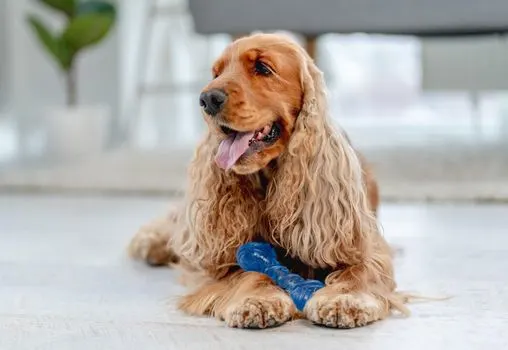 Cocker Spaniels are not hypoallergenic. No dog is hypoallergenic, as all dogs produce dander and proteins in their urine and saliva that trigger allergies.
Cocker Spaniels are not hypoallergenic. No dog is hypoallergenic, as all dogs produce dander and proteins in their urine and saliva that trigger allergies.
If you or someone in your family suffers from allergies, and you seek a hypoallergenic dog, sadly, there is no such thing.
What Does “Hypoallergenic” Mean?
The term “hypoallergenic” means that something (usually a cosmetic product or a textile) has a low likelihood of causing an allergic reaction. It is a myth that there are dog breeds that are “hypoallergenic.”
Dog breeds that some people claim are “hypoallergenic” are typically breeds that do not shed very much. However, it is not loose fur that causes an issue for allergic humans.
Human allergies to dogs are caused by proteins produced in the dog’s saliva and urine that then stick to small particles of the dog’s skin called dander. The dander falls off and is inhaled by the human, causing allergic reactions.
Dander may cling to loose hairs when they are shed, and this may cause some people’s symptoms to worsen as it increases the number of allergenic proteins in the environment, but a non-shedding dog will still produce allergens.
Is A Cocker Spaniel A Good Choice For Someone With Allergies?
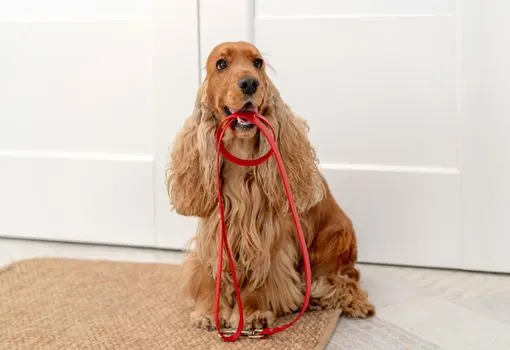 Interestingly, some humans seem to be able to tolerate the presence of some dogs and not others, with seemingly no rhyme or reason. Many studies have been conducted measuring the levels of allergens in different breeds’ saliva, and no definite conclusions have been reached.
Interestingly, some humans seem to be able to tolerate the presence of some dogs and not others, with seemingly no rhyme or reason. Many studies have been conducted measuring the levels of allergens in different breeds’ saliva, and no definite conclusions have been reached.
Some strategies can be used to reduce the number of allergens that your Cocker Spaniel may shed and how to make your home a better place to live for a person suffering from dog allergies. These will be discussed later in this article.
Getting A Pup May Avoid Allergies
 In my experience as a veterinarian, I have found that people with allergies have fewer issues with dogs they bring into their households as young puppies.
In my experience as a veterinarian, I have found that people with allergies have fewer issues with dogs they bring into their households as young puppies.
It seems possible that the young dog does not shed as many allergens as an adult dog. The allergy-suffering human becomes gradually desensitized to that dog’s specific allergens as the dog grows up.
Many clients have reported to me over the years that they are severely allergic to others’ dogs but have no issues with their pets that grew up in their household.
This gradual desensitization method is the cornerstone of allergy treatment, called immunotherapy, where a small amount of the allergen is injected into the patient regularly until the immune system becomes accustomed to it. This therapy is used in both humans and animals.
Ways To Reduce Human Allergies To Cocker Spaniels
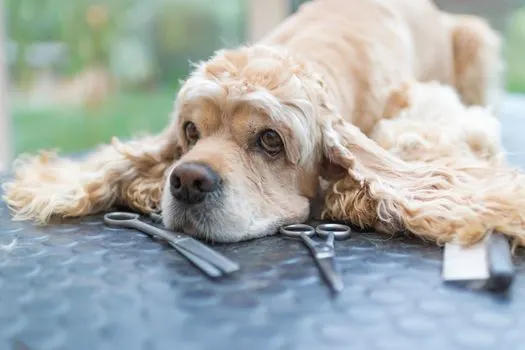 When a member of your family is allergic to dogs, but your family loves dogs, it can seem as if you are in an impossible situation.
When a member of your family is allergic to dogs, but your family loves dogs, it can seem as if you are in an impossible situation.
However, there are some things to do that may help and allow your family to experience the joy of a furry family member.
- First and foremost, make an appointment with a human allergist. There are many treatment options available that can control allergies in dogs.
- Consider choosing a small-sized dog to reduce the number of allergens in the environment of your home. A smaller dog may reduce the sufferer’s allergy symptoms.
- Always ensure the dog stays out of your bedroom or any other room where the allergy sufferer spends most of their time.
- Enjoy the outdoors with your dog. Also, have your dog stay outdoors as much as possible.
- Bathe your dog often. Frequent bathing to remove the dander from the dog’s skin can be a tremendous help. The less dander available to cause an issue, the less severe the allergies will be.
- Brush your dog’s coat often. In between baths, brush your dog often and do so outside.
- If possible, avoid carpeting in your house. Carpet holds allergens and can make pet allergies worse.
- Open the windows in your house and improve air circulation. Install a high-efficiency particulate air (HEPA) cleaner and change all furnace filters frequently. These steps will dramatically reduce the number of airborne allergens in your home.
What About Shedding?
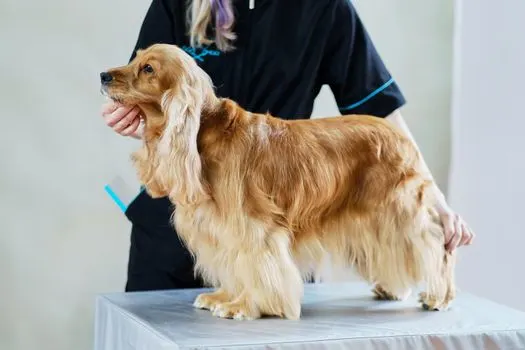 Cocker Spaniels have quite a bit of hair, and many prospective pet owners want to know if they will shed excessively.
Cocker Spaniels have quite a bit of hair, and many prospective pet owners want to know if they will shed excessively.
A Cocker Spaniel has two types of hair, called a “double-coated” breed. They have a short and soft undercoat and, on top of that, long guard hairs that make up their characteristic feathers.
Cocker Spaniels do shed, though not excessively and not as much as many other breeds. It is possible to reduce the amount the dog sheds in your house through appropriate brushing and grooming.
The dog’s hair will have three distinct phases, a growing phase (anagen), a transitional phase (catagen), and a resting phase (telogen -with a sub-phase where the hairs are shed more than usual -exogen).
The last phase, and its subphase of exogen, gets the most attention from pet parents and is sometimes referred to as the dog “blowing” its coat. In reality, this is a usually biannual occurrence where the hairs have matured and are shed more than usual.
Most dogs will go through this phase in the spring and the fall. Dogs may require extra brushing during these times.
Can A Supplement Help With Excessive Shedding?
In today’s world of quick fixes, everyone would love to find a magic pill or powder that will stop dogs from leaving their fur all over the house and furniture.
Unfortunately, shedding is a normal part of the hair cycle, especially in dogs with fur instead of hair. No diet change or supplement is going to make a dog shed less.
If a dog is shedding excessively, there may be a medical problem, such as hypothyroidism, parasites, endocrine disease, or autoimmune disorders, and a veterinarian should be consulted. For healthy dogs, frequent brushing, bathing, and a healthy diet should keep the shedding under control.
Bathing And Grooming A Cocker Spaniel
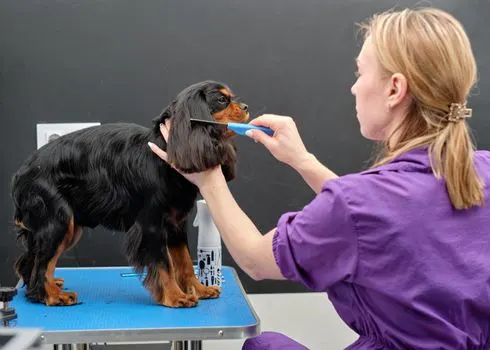 Though beautiful and full of personality, Cocker Spaniels are not low-maintenance dogs. A Cocker Spaniel requires frequent bathing and grooming.
Though beautiful and full of personality, Cocker Spaniels are not low-maintenance dogs. A Cocker Spaniel requires frequent bathing and grooming.
Baths should be given once every two weeks, but not more often, as too frequent bathing can cause dry skin.
Dog-specific dog shampoo can be used, or human baby shampoo is also a good choice as it is safe if accidentally splashed into the eyes.
Brush The Coat Thoroughly & Remove Tangles
It is highly recommended to thoroughly brush the coat and remove all tangles and mats before wetting the dog, as water will worsen these tangles and mats.
Be sure to thoroughly rinse all the shampoo out of the coat to avoid skin irritation. The shampoo left in the coat can lead to many issues if the dog scratches, including sores and secondary bacterial infections.
Take Care Of Their Ears
Cocker Spaniels are notorious for ear issues, so the utmost care must be taken to keep all water out of the external ear canal.
The ear canals should be gently cleaned with an over-the-counter flushing and drying solution, and any redness or foul smell should be reported to the dog’s veterinarian promptly.
Brush The Coat Again
Once dry, the coat will need to be brushed out once again. Many Cocker Spaniel owners choose to keep their dogs cut short to make this task easier.
A trained groomer should be consulted for grooming and trimming needs.
The groomer should ensure that there are no mats around the ears or on the dog’s feathers and trim the dog’s nails which can easily overgrow as the long hair of the feet covers them.
Frequently Asked Questions About Cocker Spaniel Care
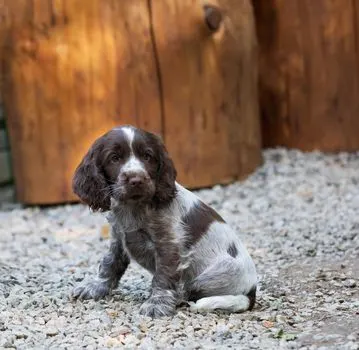 Do Cocker Spaniels have hair or fur?
Do Cocker Spaniels have hair or fur?
Hair vs. fur is a hotly debated topic with many misunderstandings. Technically, there isn’t much difference between hair and fur as both grow from the dog’s hair follicles and are composed of keratin.
However, it is generally accepted that fur is the term used for coats that grow to a certain length and then shed. Hair is the term used for coats that rarely shed and need frequent grooming. Cocker Spaniels have fur.
Is it OK to shave a Cocker Spaniel?
A widespread myth claims that double-coated breeds should never be shaved or clipped short. This is indeed a myth. Though there are considerations to removing the dog’s hair, such as an increased risk of sunburn, the dog’s coat will grow back normally.
If any issues with hair re-growth are seen, it is most likely a result of a health issue, and a veterinarian should be consulted. Clipping a high-maintenance or long-haired dog short can do wonders for the dog’s comfort and allow an owner to care for a dog they might not otherwise be able to groom properly.
Dr. Jamie Whittenburg is a vet with 15 years of clinical experience. She graduated from Kansas State University College of Veterinary Medicine in 2006. Her area of expertise is small animal general practice, equine practice, surgery, and academia.
Dr. Whittenburg operates her own hospital in Lubbock, TX, named Kingsgate Animal Hospital. Medically, she’s most interested in practicing general surgery and feline medicine. When not at work, Dr. Whittenburg enjoys outdoor activities, reading, and spending time with her family.



Leave a comment
You must be logged in to post a comment.